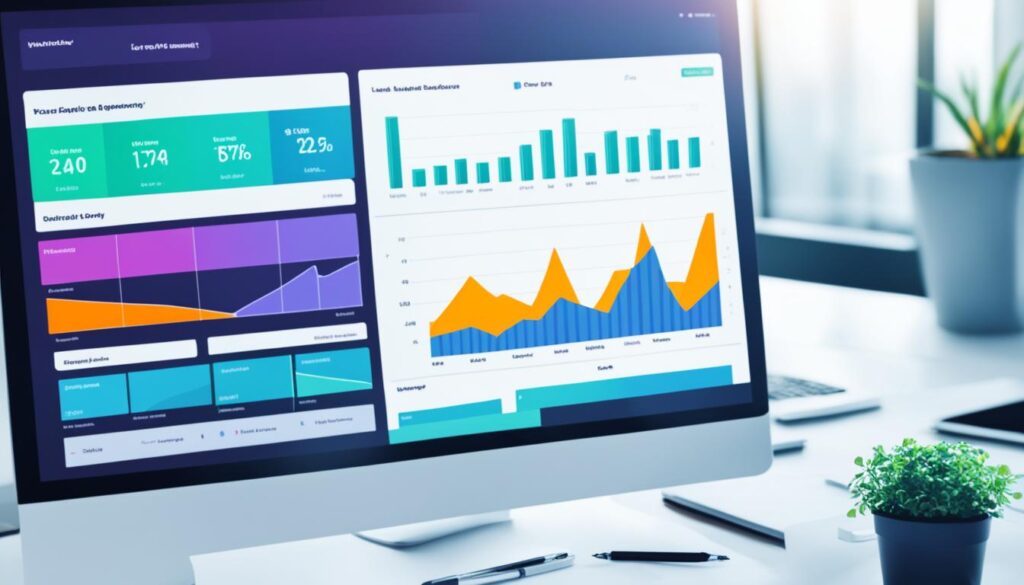The world of B2B marketing is evolving, and the traditional practices of lead generation are being challenged. The seismic shift towards data enrichment is redefining how businesses perceive, interact with, and convert B2B leads. Data enrichment goes beyond basic demographic details and includes firmographics, technographics, behavioral insights, and intent signals. Enriched data allows businesses to tailor their approaches, enhance engagement, and improve conversion rates. Integrating sales and marketing efforts is also crucial for a unified go-to-market strategy. This article explores the importance of data enrichment in lead generation strategies and how it can transform your B2B lead gen tactics.
Key Takeaways:
- Data enrichment is redefining the traditional practices of lead generation in the B2B world.
- Enriched data includes firmographics, technographics, behavioral insights, and intent signals.
- Enriched data allows for tailored approaches, enhanced engagement, and improved conversion rates.
- Integrating sales and marketing efforts is crucial for a unified go-to-market strategy.
- Data enrichment can transform your B2B lead generation tactics for better results.
Defining Data Enrichment and its Components in the B2B Context
Data enrichment in the B2B context is a strategy used to enhance existing lead or customer data with additional valuable information. It goes beyond basic demographics and includes components such as firmographics, technographics, behavioral insights, and intent signals.
Firmographics encompass various aspects of a business entity, providing a deeper understanding of its industry, size, location, and market position. This information helps businesses create more targeted and personalized marketing campaigns.
Technographics provide insights into the technology stack or tools a business uses. This knowledge enables businesses to identify compatibility and integration opportunities, tailor product recommendations, and offer relevant solutions to meet the specific needs of potential clients.
Behavioral insights focus on understanding how leads or customers interact with content, websites, or communications. By analyzing user behavior, businesses can identify patterns and preferences, enabling them to optimize their marketing strategies and deliver personalized experiences that resonate with their target audience.
Intent signals indicate the likelihood or interest of a lead or company in making a purchase. Analyzing intent signals allows businesses to prioritize high-intent leads and tailor their sales messages accordingly, increasing the chances of conversion.
Data enrichment augments and enhances lead data with additional layers of insightful information, enabling businesses to better understand their target audience and make data-driven decisions that drive success.
Benefits of Data Enrichment in the B2B Context
“Data enrichment allows businesses to gain a comprehensive understanding of their leads and customers, enabling them to create more effective marketing strategies, improve customer engagement, and drive higher conversion rates.” – Marketing Specialist at ABC Company
Data enrichment empowers businesses with the knowledge needed to build stronger relationships with their leads, customize their marketing efforts, and ultimately drive growth. By leveraging data enrichment, businesses can:
- Increase lead segmentation accuracy and deliver highly relevant content or offers.
- Optimize lead scoring models to prioritize high-quality leads.
- Enhance lead nurturing by personalizing interactions based on behavioral insights.
- Improve sales and marketing alignment by providing a complete view of lead information.
- Identify cross-selling or upselling opportunities based on firmographic and technographic data.
| Benefits of Data Enrichment | Impact on B2B Lead Generation |
|---|---|
| Enhanced lead segmentation | Targeted marketing strategies |
| Precise lead scoring | Improved lead qualification |
| Personalized lead nurturing | Higher conversion rates |
| Increased sales and marketing alignment | Unified go-to-market strategy |
| Identification of cross-selling/upselling opportunities | Maximized revenue potential |

Data enrichment plays a pivotal role in enabling businesses to unlock the full potential of their lead data. By harnessing the power of firmographics, technographics, behavioral insights, and intent signals, businesses can gain valuable insights that drive more effective marketing campaigns, enhance customer engagement, and improve conversion rates.
The Significance of Enriched Data in Understanding B2B Leads
Enriched data plays a significant role in understanding B2B leads. It transforms lead profiles from mere identifiers to dynamic personas, offering profound insights into industries, company structures, technological preferences, and lead behavior.
This comprehensive understanding allows businesses to tailor their approaches, messaging, and offerings with precision, leading to more personalized engagements and targeted strategies.
“Enriched data provides businesses with a deeper understanding of their leads, allowing them to create relevant and personalized experiences that resonate with their target audience.”
Enriched data acts as the foundation for predictive insights, strategic segmentation, and a more intuitive approach to B2B lead engagement. By leveraging enriched data, businesses can make informed decisions based on data-driven insights, ultimately enhancing conversion rates and fostering meaningful interactions with leads.
Additionally, utilizing enriched data helps businesses unlock the true potential of their lead profiles, enabling them to identify key patterns and behaviors that contribute to successful conversions.
| Benefits of Enriched Data in Understanding B2B Leads | Impact on Business |
|---|---|
| 1. Personalized Engagements | Drives higher engagement and builds stronger relationships with leads |
| 2. Targeted Strategies | Enables businesses to tailor messaging and offerings to specific lead segments |
| 3. Enhanced Conversion Rates | Increases the likelihood of converting leads into customers |
Enriched data empowers businesses to optimize their lead generation strategies, create more impactful marketing campaigns, and drive better results. By understanding B2B leads at a deeper level, businesses can unlock the true potential of their marketing efforts, delivering personalized experiences that resonate and ultimately drive conversions.

Benefits and Impact of Data Enrichment on B2B Lead Management
Data enrichment plays a crucial role in B2B lead management, offering several benefits that can significantly impact your business. By adding precision and depth to existing lead information, data enrichment improves lead quality and ensures alignment with your ideal customer profile. This leads to increased targeting accuracy, reducing the number of irrelevant or mismatched leads. Enriched data also empowers you to implement personalized and targeted marketing strategies, leveraging insights into lead industries, technological preferences, and behavioral patterns. This level of personalization enhances engagement and fosters a deeper connection with leads, resulting in increased conversion rates.
Moreover, enriched data optimizes your sales funnels by tailoring content, offers, and interactions to each stage of the buying cycle. This personalized approach ensures that leads receive relevant information at the right time, increasing the chances of conversions. With data enrichment, you can deliver a seamless and customized experience to your B2B leads, aligning your marketing efforts with their specific needs and preferences.
“Data enrichment has revolutionized our lead management process. By integrating enriched data into our strategies, we have witnessed a significant improvement in lead quality, engagement, and conversions. The personalized approach has made a remarkable difference in forging deeper connections with our leads. We highly recommend implementing data enrichment for effective B2B lead management.”
In summary, here are the key benefits and impact of data enrichment on B2B lead management:
- Enhanced lead quality through precision and depth
- Increased accuracy in targeting efforts, reducing irrelevant leads
- Personalized and targeted marketing strategies
- Improved engagement and deeper connections with leads
- Optimized sales funnels with tailored content and offers
- Higher conversion rates
Data enrichment is a powerful tool that can transform your B2B lead management, leading to increased success and growth. By leveraging enriched data, you can effectively nurture and convert leads, maximizing the value of your marketing efforts.

Strategies for Implementing Data Enrichment in Lead Generation
Implementing data enrichment in lead generation requires careful planning and execution. By following these strategies, businesses can leverage data enrichment to enhance their lead generation efforts and drive better results.
Selecting the Right Enrichment Tools
Start by selecting the right enrichment tools that align with your needs and integrate seamlessly with your existing CRM or lead management system. Consider factors such as data sources, enrichment capabilities, ease of use, and compatibility with your existing technology stack.
Establishing Clear Enrichment Goals
Establish clear objectives and priorities for data enrichment. Define the specific data points that are crucial for your business and align with your lead generation goals. This will ensure that you focus on enriching the most relevant information to better understand and engage with your leads.
Developing a Robust Data Collection Strategy
Create a robust data collection strategy that allows you to capture essential lead information at various touchpoints. This strategy should encompass both online and offline channels, ensuring that you gather comprehensive data to enrich your lead profiles.
Implementing Continuous Data Cleansing and Updating
Implement a process for continuous data cleansing and updating to ensure the accuracy and reliability of your enriched data. Regularly assess and validate the data to remove duplicates, correct errors, and update outdated information. This will help maintain the integrity and effectiveness of your data enrichment efforts.
Utilizing Enriched Data for Effective Segmentation and Targeting
Use the enriched data to segment your audience based on specific criteria such as firmographics, technographics, behavior, and intent signals. This enables you to target your messaging and offers more effectively, tailoring your approach to the unique needs and preferences of each segment.
Implementing Personalization Strategies
Leverage the insights gained from data enrichment to craft personalized interactions with your leads. Personalization allows you to deliver relevant content, offers, and experiences that resonate with your audience, increasing engagement and building stronger relationships.
Remember that implementing data enrichment is an ongoing process. Continuously monitor and measure the effectiveness of your data enrichment strategies, iterate and refine them based on the insights gained, and stay updated on the latest trends and tools in the field.
By implementing these strategies, businesses can unlock the full potential of data enrichment in lead generation, driving targeted and personalized interactions, and ultimately improving conversion rates and overall ROI.

Conclusion
The future of lead management lies in the integration of AI and data enrichment. These advanced technologies will revolutionize how businesses interact with leads and optimize their conversion rates. With predictive analytics and AI-driven data enrichment techniques, businesses will be able to anticipate lead behavior, personalize interactions, and automate nurturing processes, resulting in more effective lead management strategies.
Data enrichment will continue to be a crucial aspect of lead management, as it allows businesses to optimize lead profiles, segment their target audience, and qualify leads more effectively. By leveraging the power of enriched data, businesses can tailor their marketing efforts to specific industry verticals, technological preferences, and behavioral patterns, ensuring more targeted and personalized engagements with leads.
Moreover, the user experience in lead generation, particularly in form design and optimization, will be paramount in determining conversion rates. Streamlining and optimizing the lead capture process, such as reducing form fields and implementing autofill features, can significantly improve the user experience and increase conversion rates. By focusing on enhancing the user experience, businesses can maximize the number of high-quality leads and improve overall lead generation efforts.
Looking ahead, future trends in data enrichment for lead management include advanced predictive analytics, AI-driven data enrichment, and real-time data enrichment. These trends will enable businesses to stay ahead of the competition by leveraging the power of AI and continuously enriching their lead data. With real-time data enrichment, businesses can access the most up-to-date information about their leads, allowing for more timely and targeted marketing efforts. The synergy between AI and data enrichment will drive enhanced lead management strategies and propel B2B lead generation into the future.
FAQ
What is data enrichment in the B2B context?
Data enrichment in the B2B context is a strategy used to enhance existing lead or customer data with additional valuable information. It goes beyond basic demographics and includes components such as firmographics, technographics, behavioral insights, and intent signals.
How does enriched data help in understanding B2B leads?
Enriched data plays a significant role in understanding B2B leads. It transforms lead profiles from mere identifiers to dynamic personas, offering profound insights into industries, company structures, technological preferences, and lead behavior. This comprehensive understanding allows businesses to tailor their approaches, messaging, and offerings with precision, leading to more personalized engagements and targeted strategies.
What impact does data enrichment have on B2B lead management?
Data enrichment has a significant impact on B2B lead management. It elevates lead quality by adding precision and depth to existing information, ensuring that leads are more aligned with the ideal customer profile. This leads to increased accuracy in targeting efforts and reduces irrelevant or mismatched leads. Enriched data enables personalized and targeted marketing strategies by providing insights into lead industry, technological preferences, and behavioral patterns. This level of personalization enhances engagement and forges a deeper connection with leads, leading to increased conversions.
What strategies can businesses use to implement data enrichment in lead generation?
Implementing data enrichment in lead generation requires careful planning and execution. Businesses should begin by selecting the right enrichment tools that align with their needs and integrate seamlessly with their existing CRM or lead management system. Clear objectives and priorities for data enrichment should be established, defining the specific data points crucial for the business. A robust data collection strategy should be developed to capture essential lead information at various touchpoints, and continuous data cleansing and updating should be implemented to ensure accuracy. Enriched data should be used for effective segmentation and targeting, creating audience segments based on specific criteria. Personalization strategies should also be implemented, using enriched insights to craft personalized interactions with leads. Monitoring and iterative improvement should be a continuous process to refine data enrichment strategies.
What does the future hold for data enrichment in lead management?
The future of lead management lies in the integration of AI and data enrichment. Advanced predictive analytics and AI-driven data enrichment techniques will enable businesses to anticipate lead behavior, personalize interactions, and automate nurturing processes. Data enrichment will continue to play a crucial role in optimizing lead profiles, segmentation, and lead qualification. User experience in lead generation, particularly in form design and optimization, will be a determining factor in conversion rates. The future of data enrichment for lead management includes trends such as advanced predictive analytics, AI-driven data enrichment, and real-time data enrichment. The synergy of AI and data enrichment will lead to enhanced lead management strategies and improved B2B lead generation efforts.








